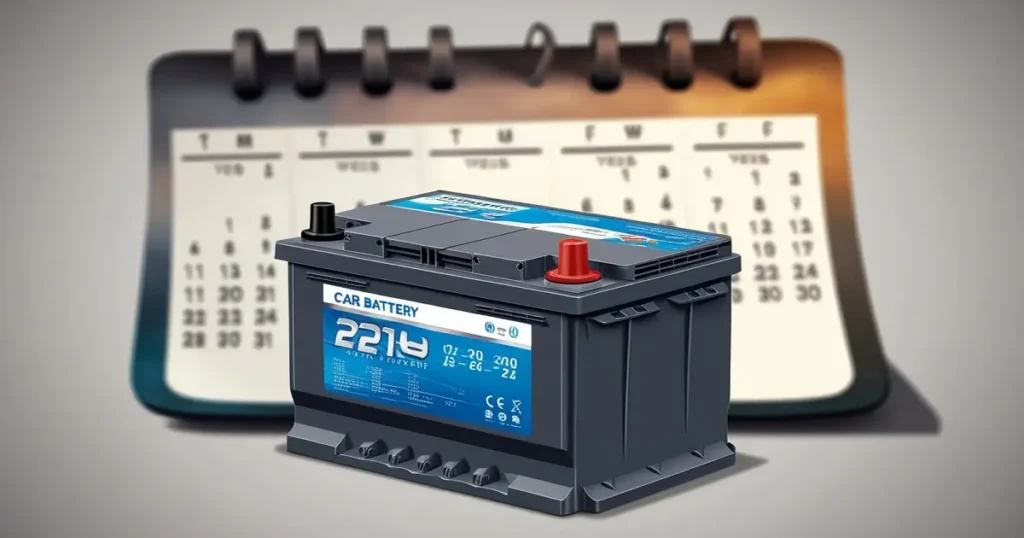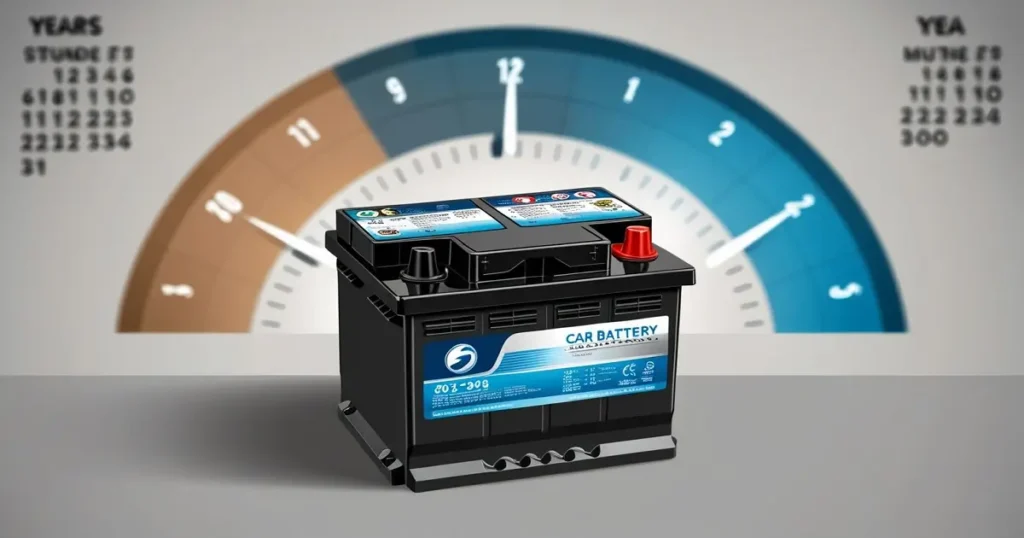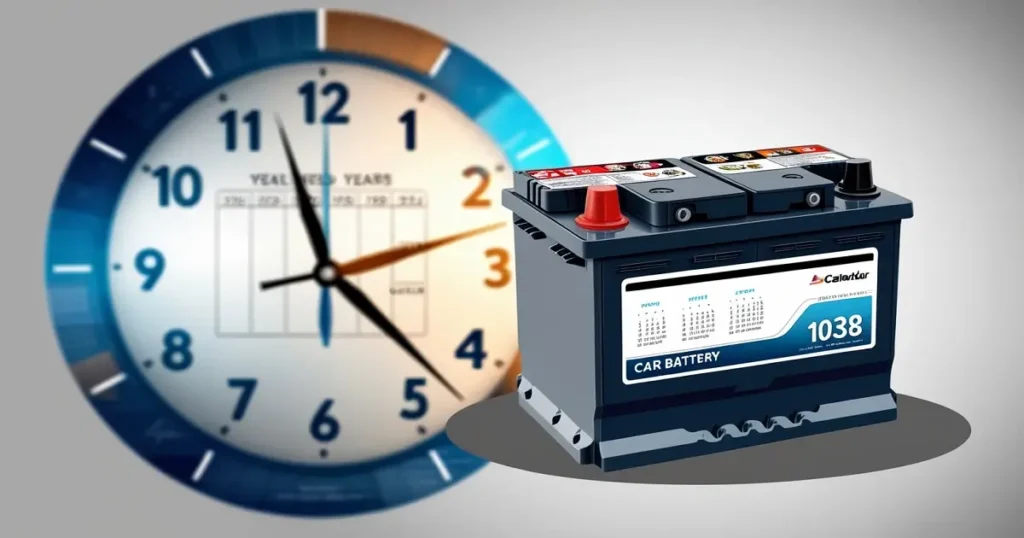Introduction
Imagine this: you’re running late for work, you hop in your car, turn the key, and… click, click, click. Nothing. That dreaded sound means one thing—a dead car battery. We’ve all been there, and it’s never fun! But what if you could avoid that stressful surprise? Understanding how long do batteries last in a car is like having a secret superpower for car ownership. It saves you time, money, and a whole lot of hassle. Your car’s battery is the silent hero, working behind the scenes to start your engine and power everything from your radio to your phone charger. In this guide, we’ll break down everything you need to know in simple, easy-to-understand language. We’ll explore what affects battery life, how to make yours last longer, and the signs that it’s time for a replacement. Get ready to become a battery expert!
Table of Contents
What is a Car Battery?
Think of your car’s battery as its heart. Just like your heart pumps blood to give your body energy, the battery pumps electrical power to start your car’s engine and run all its cool gadgets. It’s a plastic box filled with a special liquid (called electrolyte) and metal plates. A chemical reaction inside the box creates electricity. When you turn the key, it sends a huge jolt of this electricity to the starter motor, which cranks the engine to life. After that, the car’s alternator takes over to power the car and recharge the battery for the next start. It’s a pretty amazing cycle! Ever wonder if your car is smarter than your phone? Well, it can’t play videos, but it knows exactly how to manage its own power supply to get you where you need to go.

Why You’ll Love Understanding Your Car Battery
Knowing about your car’s battery isn’t just for mechanics; it’s for every driver! Here’s why you’ll love getting to know this essential piece of car parts:
- Save Money: Replacing a battery before it dies completely can often save you from more expensive problems, like being stranded and needing a costly tow truck or a last-minute, overpriced battery replacement.
- Avoid Stress: The peace of mind that comes with knowing your battery is in good health is priceless. No more nervousness on cold mornings or before a big road trip.
- Become a Smarter Driver: This knowledge empowers you to make better decisions about car maintenance. You’ll understand what a mechanic is talking about and know when a recommendation makes sense.
- Extend Your Battery’s Life: By learning a few simple tricks, you can help your battery last longer than average, getting the most value out of your investment.
Understanding how long do batteries last in a car is the first step to becoming a more confident and prepared car owner. It’s all about taking control and avoiding those nasty surprises!
How Long Do Batteries Last in a Car: The Quick Answer
So, let’s get right to the big question: how long do batteries last in a car? On average, you can expect a car battery to last between 3 to 5 years. But please remember, that’s just an average. It’s like asking how long a pair of shoes lasts—it depends on how often you wear them, what terrain you walk on, and how well you take care of them!
Some batteries might call it quits after just two years, while others, with perfect care and a little luck, can keep going for 6 years or more. The key is to start checking your battery’s health regularly once it hits the three-year mark. Don’t just wait for it to fail! A quick test at any auto parts store (often offered for free!) can tell you how much life it has left. This simple step is the best way to plan for a replacement on your own terms, not your battery’s.

Key Factors That Affect How Long Car Batteries Last
Why is there such a big range in battery lifespan? It’s because many different things can wear a battery out faster. Let’s look at the main factors that answer the deeper question of how long do batteries last in a car.
1. Climate and Weather
Extreme weather is a battery’s worst enemy.
- Extreme Heat: High heat under your hood speeds up the chemical reaction inside the battery. This causes the fluid to evaporate faster and leads to internal corrosion. This is the number one cause of a shortened battery life, especially in southern states.
- Extreme Cold: Cold weather doesn’t kill the battery, but it exposes a weak one. Cold engine oil is thicker, making the engine harder to turn over (crank). This requires more power from the battery. If the battery is already old and weak, it won’t have the extra strength needed, and it will fail.
2. Driving Habits
How you use your car directly impacts your battery health.
- Short Trips: If you only take short, 5-10 minute drives, your battery never gets a full charge from the alternator. It’s like only ever charging your phone to 50%; it slowly drains down over time. This state of low charge, called sulfation, can permanently damage the battery.
- Frequent Starts: Delivery drivers or people who make many stops in a day put extra strain on the battery, as the initial engine crank is the single biggest drain on its power.
3. Electrical Load and Parasitic Drain
Your modern car has so many electronics! All of them draw power.
- Accessories: Constantly running things like high-power stereos, dash cams (that don’t shut off), phone chargers, and interior lights add strain.
- Parasitic Drain: This is a tiny, constant power draw from your car’s computers and systems even when the car is off. Normally, it’s very small. But if there’s an electrical problem, a module might not “sleep” properly and can drain the battery dead overnight.
4. Battery Type and Quality
Not all car batteries are created equal.
- Flooded Lead-Acid: The standard, most common type. They require occasional checking of water levels.
- Absorbent Glass Mat (AGM): Higher-end batteries found in many modern cars with start-stop technology. They handle deeper discharges and recharge faster, and they typically last longer than standard batteries. They are also completely sealed.
- Brand and Warranty: A longer warranty often (but not always) indicates a better-built battery that is designed to last longer.
5. Vehicle Maintenance
A poorly maintained car can kill a good battery.
- Loose Belts: If the serpentine belt that drives the alternator is loose, it won’t charge the battery properly while you drive.
- Corroded Terminals: Buildup of white, ashy gunk on the battery terminals prevents a good connection, making it harder for the battery to send and receive power.
Step-by-Step: How to Check Your Car Battery’s Health
You don’t need to be a mechanic to keep an eye on your battery. Here’s a simple guide to checking up on it.
Visual Inspection (Do this every few months!)
- Pop the Hood: Make sure the engine is off and the car is cool.
- Look for Corrosion: Check the battery terminals (the metal posts on top where the cables connect). If you see white, blue, or green crusty stuff, that’s corrosion. It needs to be cleaned.
- Check for Damage: Look at the battery case itself. Is it bulging, cracked, or leaking? If yes, it needs immediate replacement.
- Check the Age: Look for a small sticker on the battery case. It often has a date code like “9/20” (September 2020) or a code like “C2” where the letter is the month (A=Jan, B=Feb, etc.) and number is the year (2=2022).
Listening for Signs
- That slow, dragging rurr-rurr-rurr sound when you start the car is the classic sign of a weak battery.
Professional Testing
The best way to know for sure is to get it tested for free!
- Where to Go: Most major auto parts stores (like AutoZone, Advance Auto Parts, O’Reilly) will test your battery and alternator for free. They bring a handheld tester right out to your car in the parking lot.
- What it Does: The tester puts a “load” on the battery and measures its ability to hold a charge. It gives a simple result: Good, Good but Recharge, or Replace.
Top Tips for Making Your Car Battery Last Longer
Want to get the absolute most life out of your battery? Follow these expert car maintenance tips:
- Take Weekly Long Drives: Make sure to take a drive of at least 20-30 minutes at highway speeds at least once a week. This ensures the battery gets a full, strong charge from the alternator.
- Keep It Tight and Clean: Ensure the battery is secured tightly in its tray so it doesn’t vibrate, which can damage internal parts. Clean any corrosion off the terminals with a mix of baking soda and water and a wire brush (wear gloves and eye protection!).
- Avoid Power Drains When Off: Double-check that all interior lights, trunk lights, and accessories like phone chargers or dash cams are unplugged or turned off when you exit the car.
- Protect It From Extreme Cold: If you park outside in a very cold climate, consider using a battery blanket (a small electric heater that wraps around the battery) to keep it warm. Alternatively, if you have a garage, use it!
- Get It Tested Regularly: Once a battery is 3 years old, get it tested every time you get an oil change. It’s a free and easy way to stay ahead of any problems.
- Consider a Battery Tender: If you aren’t driving your car for weeks or months (like a classic car or a seasonal vehicle), use a “battery tender” or “maintainer.” This is a smart charger that plugs into a wall outlet and connects to your battery to keep it perfectly charged without overcharging it. Do not use a standard charger for this!
What to Pair Your Car Battery Knowledge With
Understanding how long do batteries last in a car is powerful, but pairing that knowledge with the right tools makes you unstoppable!
- A Good Multimeter: For the slightly more adventurous owner, a cheap digital multimeter lets you check your battery’s voltage yourself. A reading of 12.6 volts or above when the car is off means it’s fully charged.
- A Portable Jump Starter: This is a must-have for every glove box! These are now small, affordable, and powerful lithium-ion battery packs that can jump-start your car all by yourself, without needing another car or helpful stranger. It’s the ultimate peace-of-mind tool.
- A Battery Terminal Cleaning Tool: A simple, inexpensive tool that has wire brushes to clean both the battery posts and the inside of the cable clamps, ensuring a perfect connection.
- A Battery Blanket: As mentioned, essential for those living in frigid winters.
How to Stay Updated with Car Battery Tech
Car technology is always improving, and batteries are no exception! Here’s how to stay in the loop:
- Subscribe to Automotive YouTube Channels: Channels like “ChrisFix,” “Scotty Kilmer,” and “The Car Wizard” offer fantastic, easy-to-follow advice on all things car repair and maintenance, including batteries.
- Follow Car Tech Blogs: Websites like Car and Driver, Road & Track, and J.D. Power often have articles on new battery technology and maintenance tips.
- Join Online Forums: If you own a specific make and model of car, there is almost certainly an online forum or Facebook group dedicated to it. These are goldmines of owner-specific advice and experiences.
- Talk to Your Mechanic: Don’t be shy! Ask your trusted mechanic to show you your battery’s test results and explain what they mean. A good mechanic is happy to educate their customers.

Conclusion: Be the Master of Your Battery’s Destiny
So, how long do batteries last in a car? As we’ve learned, it’s usually 3-5 years, but it’s really up to you. Your driving habits, the weather you live in, and how well you maintain your car are the real deciding factors. You don’t have to be a victim of a dead battery. By understanding the basics, doing simple visual checks, and getting free tests at your local auto shop, you can see the signs long before you’re left stranded. A little bit of knowledge and preventative care goes a long way in extending the life of your battery and ensuring your car is always ready when you are. Remember, your car’s battery is its heart—take good care of it, and it will take good care of you.